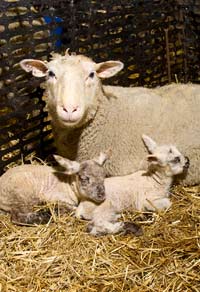Essential pre-lambing supplements

Late lambing flocks should ensure ewes are provided with an adequate supply of essential elements to prevent problems at lambing, says James Brinicombe, director of Denis Brinicombe Group.
Calcium and Magnesium
Two of the key minerals at lambing are calcium and magnesium. “In the last six weeks of pregnancy there is a huge demand on the ewe to support the skeletal development of the growing lambs, produce future colostrum and tone muscle along the reproductive tract.
And when there is an inadequate supply or balance of calcium and/or magnesium then the ewe will suffer from Pregnancy Toxemia and possible Ringwomb at lambing.
“The cervix may not be able to dilate sufficiently or at all, resulting in Ringwomb and preventing a natural unassisted birth.
“Having the correct balance of calcium and magnesium will aid muscle tone, along the reproductive tract, which will help to induce an easy lambing,” Mr Brinicombe continues.
Selenium and Vitamin ESelenium and vitamin E deficiency is also a common underlying problem influencing neo-natal deaths from starvation, hypothermia and pneumonia.
“Roughly 10-15% of the annual lamb crop in the UK dies each year just after being born – correcting selenium and vitamin E deficiencies can be helpful in addressing lamb mortality problems by significantly improving lamb vigour at birth,” Mr Brinicombe explains.
The ewe is the major natural supplier of selenium and vitamin E to the newborn. And with the majority of neo-natal selenium uptake occurring while the foetus is in the uterus, adequate ewe supplementation is essential.
“Selenium not only boosts the immune system of the unborn lamb but, controls the ‘shiver’ mechanism which lambs use to convert brown fat into energy.” This generates body heat and encourages the lamb to get up and suckle more quickly.
Colostrum and milk are considered to be minimal sources of selenium for the lamb but, in contrast, vitamin E, which does not readily cross the placenta, is supplied almost entirely from the colostrum in the vital first few day of life.
Vitamin A“During birth, mucus is nature’s lubricant and good levels of vitamin A are vital to ensure healthy mucus membranes,” he says.
“And farmers who supplement the required levels have fewer assisted births and ‘wetter lambings’.”
Energy SupplySugars that provide an immediate source of energy to the pregnant ewe help to offset Twin Lamb Disease and maintaining the levels of highly available magnesium, cobalt and vitamin B complex will also help to combat this condition and improve the energy supply.
“Denis Brinicombe Group’s Tub PPL is proven to be effective and will supply all the essential elements described in this article. Using it will take the pressure off a shepherd when time is the one element in shortest supply,” Mr Brinicombe says.
